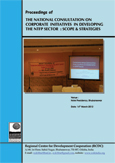 The national consultation on corporate initiatives in developing the ntfp sector : scope & strategies
The national consultation on corporate initiatives in developing the ntfp sector : scope & strategies
Publication Date : 14-Mar-2012
Indian industries have been sourcing their raw materials from the rich & diverse nontimber
forest product(NTFP) resources of the country since long
|
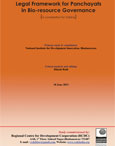 Legal Framework for Panchayats in Bio-resource Governance
Legal Framework for Panchayats in Bio-resource Governance
Publication Date : 18-Jun-2012
Bioresource governance primarily and immediately focuses on the governance of the living entities under jurisdiction, but practically it has to focus also on the non-living/abiotic entities like land and water as they form the habitat of the biotic elements.
|
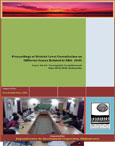 Proceedings of District Level Consultation on Different Issues Related to FRA- 2006
Proceedings of District Level Consultation on Different Issues Related to FRA- 2006
Publication Date : 20-Jun-2012
The Forest Rights Act (FRA), 2006 is being implemented in the state since 1st January, 2008. Regional Centre for Development Cooperation (RCDC) is engaged in proper implementation of the Act throughout the state of Odisha, India including Gajapati district since its year of implementation.
|
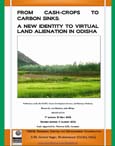 From Cash Crops to Carbon Sinks
From Cash Crops to Carbon Sinks
Publication Date : 17-Aug-2012
A study on land alienation in Odisha. The natural-resource-based life & livelihood is fast becoming a tradition of the past with the new generation focusing on careers and livelihood options that relate to a synthetic and artificial world. Resources are abandoned or alienated in this process, CPRs are ignored/neglected/encroached, and household/rural economy is more & more controlled by alien actors. Conventional cropping being replaced by pulpwood plantation is but a reflection of this misery.
|
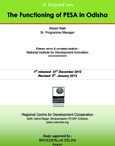 Report on Functioning of PESA in Odisha
Report on Functioning of PESA in Odisha
Publication Date : 14-Jan-2013
RCDC assigned a task of compiling a report on the functioning of PESA in the state of Odisha based both on secondary analysis and primary survey at field level, to a local consultant organization National Institute for Development Innovation(NIDI) in late 2010.
Agreeing with our observation that the report submitted under the same required further improvements and enrichments the consultant made fresh efforts in 2011 and submitted an improved version of the same without any extra charges. However, we found that to make it a
public document useful to all stakeholders we need to modify the same significantly and add new section(s) as well as some exclusive analysis to this report. If this modification took almost a year to complete then that is primarily because of the limitations of time on the part of the undersigned to devote sufficient time for the same, but that in fact proved to be a blessing in disguise ultimately as some remarkable developments took place in the meantime helping us to prepare an updated version.
|
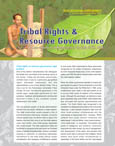 Tendu Leaf Management in Light of FRA
Tendu Leaf Management in Light of FRA
Publication Date : 14-Jan-2013
Due to its great economic value as well as social importance, Tendu leaf, also known as the ‘golden leaf’, can and does influence governments across party lines. While revenue from tendu leaves
accounts for 80 -90% of the total forest revenue, it also provides the second largest avenue for employment, next only to agriculture. More importantly, it provides employment in the agricultural
lean season and enables a farmer to earn money for investment in the next agricultural operation.
|
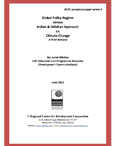 Global Policy Change Vs Odishan Approach on Climate Change
Global Policy Change Vs Odishan Approach on Climate Change
Publication Date : 07-Feb-2013
India ratified the United Nations Framework Convention on Climate Change (UNFCCC) in 1993, and the Kyoto Protocol in 2002.
Under the Convention, India (and other developing countries), has not had to undertake legally binding commitments to reduce its greenhouse gas (GHG) emissions, since the major proportion
of the problem (and historical responsibility) was due to emissions from developed countries. As a result, the Kyoto Protocol the burden of emissions reductions is not placed on India (and other
developing countries) ‐ they are exempt from mandatory emissions reductions.
|
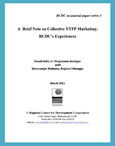 A Brief Note on Collective NTFP Marketing: RCDC's Experience
A Brief Note on Collective NTFP Marketing: RCDC's Experience
Publication Date : 07-Feb-2013
Collective marketing of NTFPs has been a common strategy to help secure the rights of & benefits for the primary collectors, particularly for women. As well-known the traders and even
the intermediaries are men whereas the primary collectors are usually women. Traders thrive on the ignorance & innocence of these primary collectors, and collective effort gives the latter a
better scope to deal with the hard realities of market dynamics. It gives a better bargaining power, helps control the process from collection to value addition followed by marketing so as to
facilitate sustainable extraction practices, relaxes the burden of loss by sharing among the members, creates better scope for availing support for capacity building (technical/financial), and
ultimately makes them able to go beyond trading and support something for the cause of the society(like, facilitating the implementation of Forest Rights Act, providing employment to
physically-challenged or otherwise vulnerable individuals, etc.). When cooperatives extend their services for the greater benefit of the society, they become what may be called Socially
Embracing Cooperatives.
|
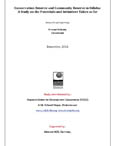 Conservation Reserve and Community Reserve in Odisha
Conservation Reserve and Community Reserve in Odisha
Publication Date : 07-Feb-2013
This report titled Conservation Reserve and Community Reserve in Odisha: A Study on the Potentials and Initiatives Taken so far is an outcome a series of case studies, with collection of information through RTI, other sources like web-portal & literatures, discussion with forest officials, and its detailed analysis.
|
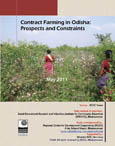 Contract Farming in Odisha: Prospects and Constraints
Contract Farming in Odisha: Prospects and Constraints
Publication Date : 07-Feb-2013
Contract farming is one of the illustrated examples of the impact of globalization and liberalized economic policy in the agriculture sector. While the farm sector is facing an identity crisis amidst
growing dominance of the industrial sector, contract farming helped to create a new hope in this scenario. It established a link between the farm sector and the corporate sector too. This way it
created new prospects for the agricultural sector, and added to the dignity of the farmer. However, the actual practice was often not so farmer-friendly. Rather it was an arrangement to best exploit the
farmers’ lands in the interest of the contracting agency. Innocence and ignorance of the farmers,absence of a strong farmer-security mechanism, and tactfully drafted legal papers favoured the other
side very much. And the result was quite obvious; farmers suffering in many ways, long-term socioeconomic and environmental threats perceived, and marginality of farmers getting increased.
|
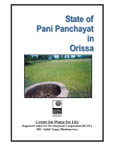 State of Pani Panchayat in Odisha
State of Pani Panchayat in Odisha
Publication Date : 07-Feb-2013
The Orissa Government, with a view to providing equitable, timely and assured irrigation has introduced the concept of Pani Panchayat for PIM. The concepts would finally lead to transfer of tertiary irrigation networks (minor/sub-minors)to registered Pani Panchayats. The responsibility of operation and maintenance (O&M) of the reservoir/ diversion weir (as the case may be) dam, spillways,
sluices, primary and secondary distribution networks etc. rest with the department of water resources, whereas the responsibility of O&M of the tertiary systems i.e. below minor and sub-minor would remain with the Pani Panchayat. The geographical extent of the programme covers the entire state comprising of about 16 lakh hectares of major, medium and minor irrigation command areas in
all 30 districts of Orissa.
|
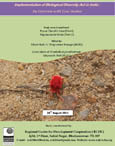 Implementation of Biological Diversity Act in India
Implementation of Biological Diversity Act in India
Publication Date : 07-Feb-2013
The study on the actual implementation of the Biological Diversity Act was commissioned by RCDC in 2010. As the report submitted by the 1st consultant did not focus on state-level field verifications, a second phase of the study was then assigned to another consultant so as to analyse & document the actual status in four different states. Hence, the present compilation has two parts: one reflecting the
overall policy scenario and the other reflecting on the actual status in the field-level implementation. However, the study could not contain extensive field information owing to a number of limitations including constraints of time.
|
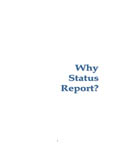 Why Status Report? (On Water)
Why Status Report? (On Water)
Publication Date : 07-Feb-2013
The quantity and quantity of drinking water the citizen get is an indicator of development of the people of the state. Perceptions about the drinking water scenario in Orissa have been a point of debate since quite some time. The media paints the drinking water scenario in the state as quite bleak. One will hardly
find a community development block in the state from where the newspapers have not reported water scarcity or suffering of people not having access to potable water. But the claims by the government as well as the government documents give an altogether different picture. Government claims to have provided drinking water to all. At least that is what the statistics of tube wells and water supply schemes in Orissa say. These two different pictures of drinking
water scenario in the state is so widely different that one fails to draw a conclusion about the real drinking water scenario in the State of Orissa.
|
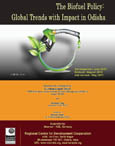 The Biofuel Policy: Global Trend With Impact in Odisha
The Biofuel Policy: Global Trend With Impact in Odisha
Publication Date : 07-Feb-2013
The biofuel perspective projects a responsibility and preparedness to face the depleting resources of mineral fuels. Biofuel policy papers are among the few policy statements that are primarily scientific with little or no political element in them, and rather represent a political responsibility with a scientific
approach. However, in reality(and unfortunately) they have rather become effective mediums of a political economy that allows vested interest groups to humbly dominate the scene and flourish their business. In brief, the cause of earth & its people turns into the cause of some seed-suppliers and related business groups.
|
 The Industrial Perspective of NTFP in India
The Industrial Perspective of NTFP in India
Publication Date : 07-Feb-2013
Indian industries have been sourcing their raw materials from the rich & diverse non-timber
forest product resources of the country since long. As detailed below they use either one or
more of these products and are in some cases almost exclusively or critically dependent on
the same:
• Paper industry: Bamboo(critical), sabai grass
• Bidi industry: Tendu leaf(critical)
• Lac processing industries: Lac(critical)
• Leather industry: Chebulic myrobalan and some other natural tan-stuff from forest
• Pharmaceuticals: Wide range of NTFPs used(critical in some cases, like Boswellia
serrata cream produced by CIPLA)
• Cosmetics: Wide range of NTFPs used(critical in some cases)
• Agarbatti industry: bamboo stick, glutinous bark, sal resin, guggul, etc.(critical)
• Vanaspati industry: mahua oil, sal seed oil, etc.
• Bio-fuel industry: karanj seed, etc.
|
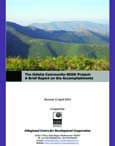 Odisha Community REDD Project - Brief Report
Odisha Community REDD Project - Brief Report
Publication Date : 18-Apr-2013
Report on REDD+ Evaluation
|
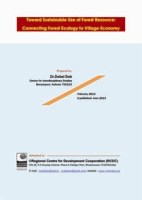 Ecological Study Report on REDD+
Ecological Study Report on REDD+
Publication Date : 24-Jun-2013
Toward Sustainable Use of Forest Resource: Connecting Forest Ecology to Village Economy, a study on behalf of RCDC by Dr Debal Deb
|
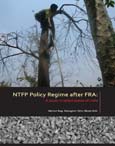 NTFP Policy Regime after FRA
NTFP Policy Regime after FRA
Publication Date : 31-Dec-2010
RCDC intends to bring a policy change through this publication at appropriate level, with corresponding reflections at
the ground level. Whereas the present study analysed the situation in eight states of India, the basic observations
are more or less same throughout the country; hence the basic recommendations & conclusions are applicable for the
country. However, some of the statistical data might have changed in the meantime, and also few policy changes
might also have occurred at the state level. Readers are therefore advised to update themselves with the latest
developments.
|
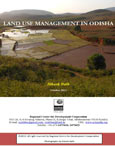 Land use management in Odisha
Land use management in Odisha
Publication Date : 26-Oct-2013
RCDC pursued a bio-resource governance programme during the period of 2009-11 in four tribal districts of Odisha with an objective of developing model GPs on bioresource governance. Land use being a major factor in natural resource governance, changes in land utilization, particularly forest land diversion, has been a matter of concern for these areas.
In this backdrop, RCDC intended for an in-depth analysis of the dynamics of the changes in land utilization pattern in the state with focus on forest land diversion. The work was assigned to a consultancy firm SERVICE which submitted its report in 2011. The study was carried out under the project supported by Broederlijk Delen, one of RCDC’s trusted partners in development.
|
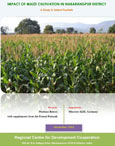 REPORT ON THE IMPACT OF MAIZE CULTIVATION IN NABARANGPUR DISTRICT
REPORT ON THE IMPACT OF MAIZE CULTIVATION IN NABARANGPUR DISTRICT
Publication Date : 26-Nov-2013
Since the last 10-15 years, hybrid maize cultivation has taken over the traditional crops of the Nabarangpur district to a large extent. The main area of maize cultivation comes under the Umerkote and Jharigan Blocks. RCDC has been concerned to see that this cultivation expands at the cost of both the ecology of the area, and also the social and socioeconomic strength of the area. Large areas of good forest have been cleared for this cultivation, and use of pesticides has increased environmental pollution in the area threatening the very health of the farmers. Moreover, the innocent farmers do not understand that despite an encouraging cash flow the cultivation doesn’t actually offer a good return in terms of net gain. Since RCDC doesn’t see such kind of a practice to be a sustainable development option, hence it was decided to conduct a small study on the real dynamics of maize cultivation in the region, and for this purpose Umerkote and Jharigan blocks were selected for the survey.
|
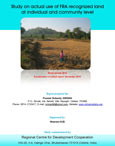 Study on actual use of FRA recognized land at individual and community level
Study on actual use of FRA recognized land at individual and community level
Publication Date : 02-Dec-2013
This study on “Actual use of FRA recognized land at individual and community level” is an outcome of series of case studies, information collected through RTI, other sources like govt. convergence guideline & literatures, discussion with village communities, community federation, campaign group and CSOs, and its detailed analysis.
|
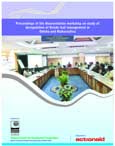 Kendu Leaf Workshop Report
Kendu Leaf Workshop Report
Publication Date : 18-Apr-2014
Kendu Leaf Workshop Report 19th Dec 2013
|
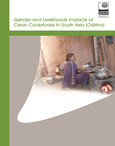 Gender and Livelihood Impacts of Clean Cookstoves in South Asia
Gender and Livelihood Impacts of Clean Cookstoves in South Asia
Publication Date : 10-Nov-2014
Gender and Livelihood Impacts of Clean Cookstoves in South Asia
|
 Schools Still Unclean
Schools Still Unclean
Publication Date : 14-Nov-2015
The assessment was carried out by 20 civil society organisations of Odisha under the banner ‘Odisha Right to Education (RTE) Forum’; with coordination support from ‘Regional Centre for Development Cooperation’ (RCDC), Bhubaneswar; and financial support of ‘WaterAid, India’.
|
 KAP Study_Chola
KAP Study_Chola
Publication Date : 28-May-2018
KAP Study of Chola supported project in Bolangir
|
 CFM Initiative in Odisha by RCDC
CFM Initiative in Odisha by RCDC
Publication Date : 30-Nov-2020
CFM Initiative in Odisha by RCDC
|
 CFR Management Plan of Jambani
CFR Management Plan of Jambani
Publication Date : 31-Dec-2020
CFR Management Plan of Jambani
|
 Prospering despite adversities_Experiences of women displaced due to climatic shocks
Prospering despite adversities_Experiences of women displaced due to climatic shocks
Publication Date : 15-Sep-2023
.
|
 Report on Exposure Visit of Farmers on Natural Farming Practices
Report on Exposure Visit of Farmers on Natural Farming Practices
Publication Date : 02-May-2024
Report on Exposure Visit of Farmers on Natural Farming Practices
|